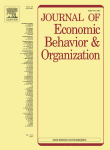
Do gender wage differences within households influence women's empowerment and welfare? Evidence from Ghana
Danquah, Abdul / Malik Iddrisu / Ernest Owusu Boakye / Solomon OwusuExterne Publikationen (2021)
in: Journal of Economic Behavior & Organization 188, 916-932
DOI: https://doi.org/10.1016/j.jebo.2021.06.014
Open access
Using household data from the latest wave of the Ghana Living Standards Survey, this paper utilizes machine learning techniques – IV LASSO – that allows for the treatment of unconfoundedness in the selection of observables and unobservables to examine the structural effect of gender wage differences within households on women's empowerment and welfare in Ghana. The structural parameters of the IV LASSO estimations show that a reduction in household gender wage gap significantly enhances women's empowerment. Also, a decline in household gender wage gap results meaningfully in improving household and women's welfare. Particularly, the increasing effect on women's welfare resulting from decreases in household gender wage differences is much higher than for the household welfare. The findings showcase the need to vigorously adopt policies that both increase the quantity and quality of jobs for women and address gender barriers that inhibit women from accessing these jobs opportunities in sub-Saharan Africa.
